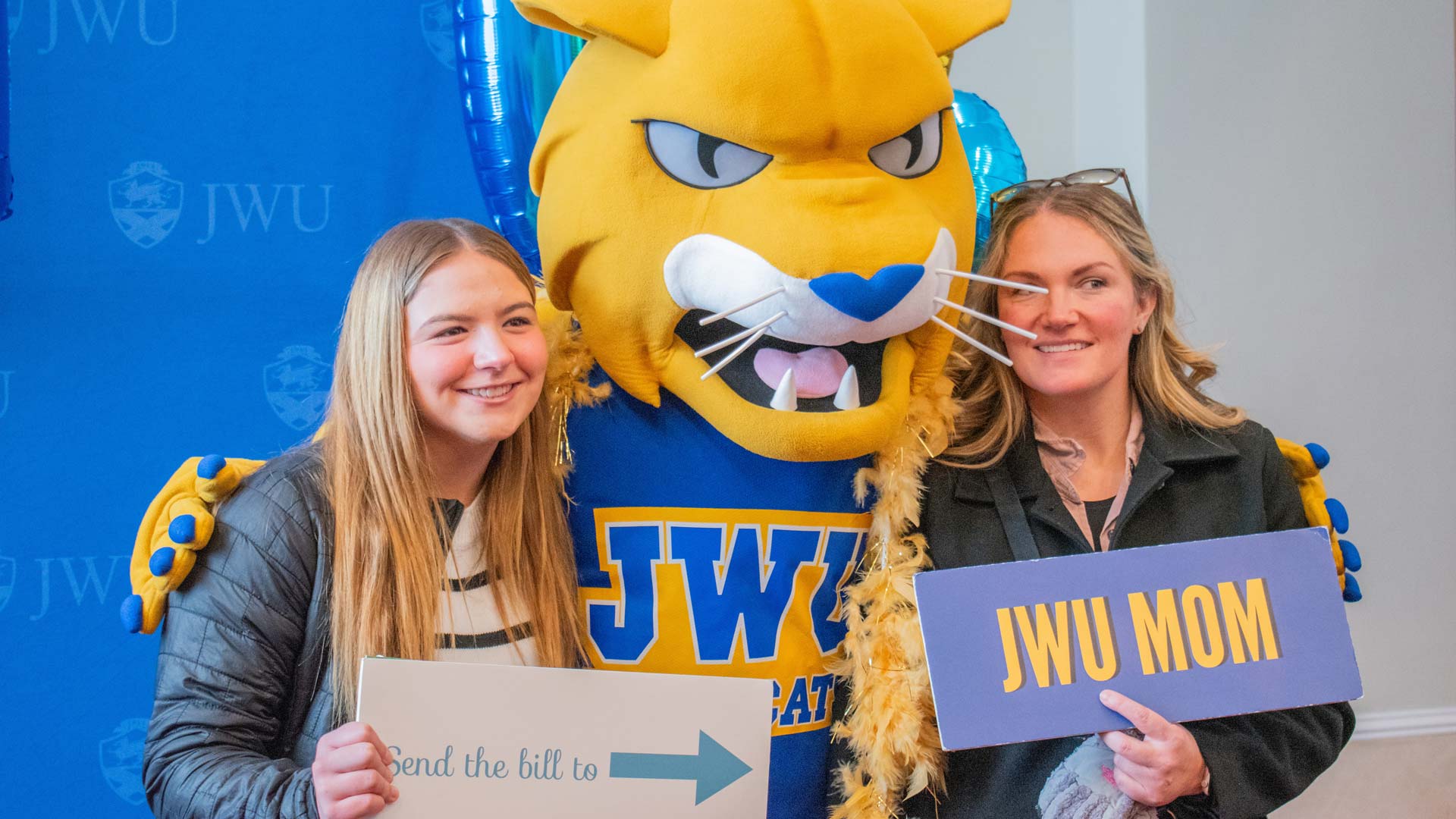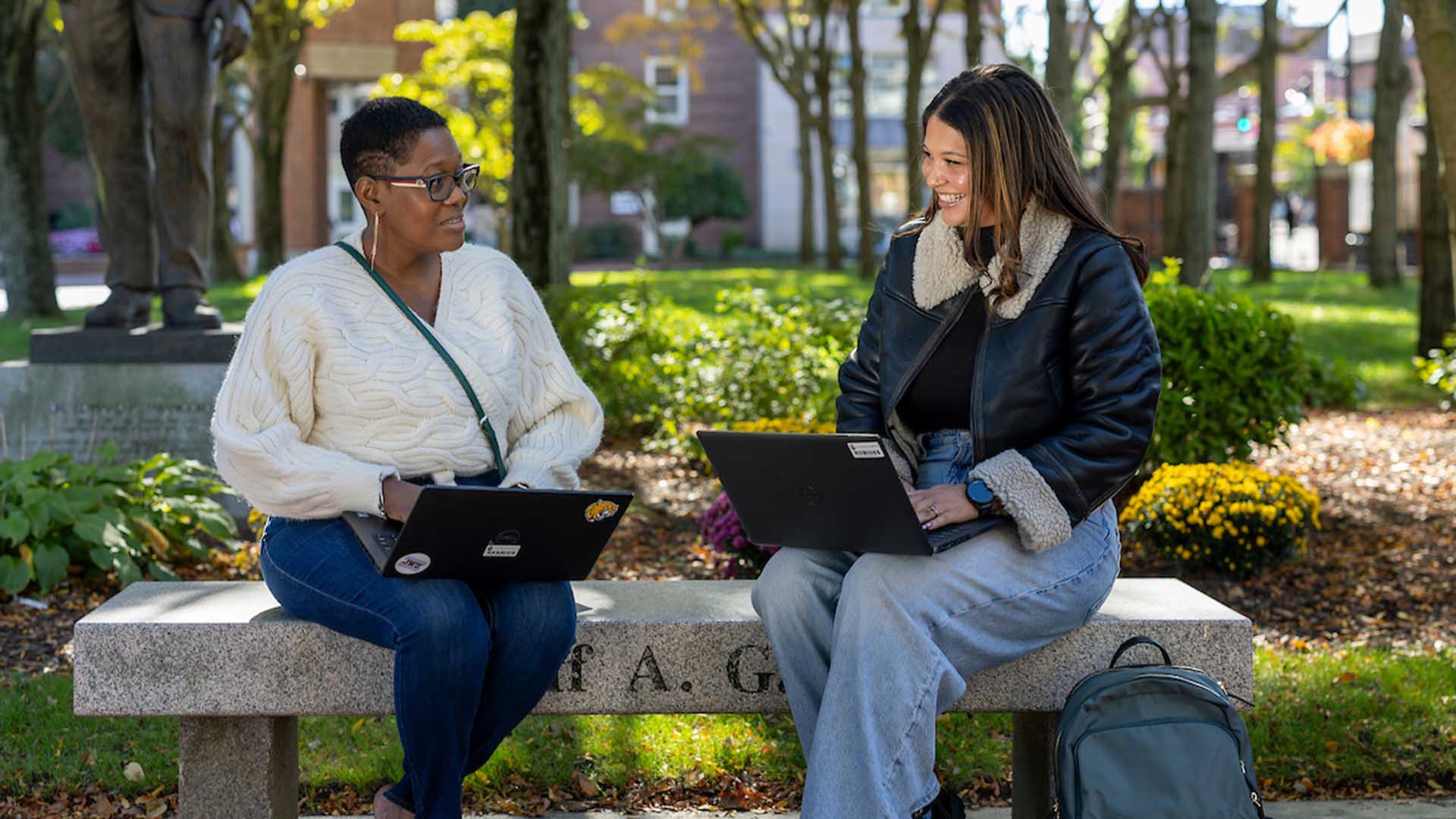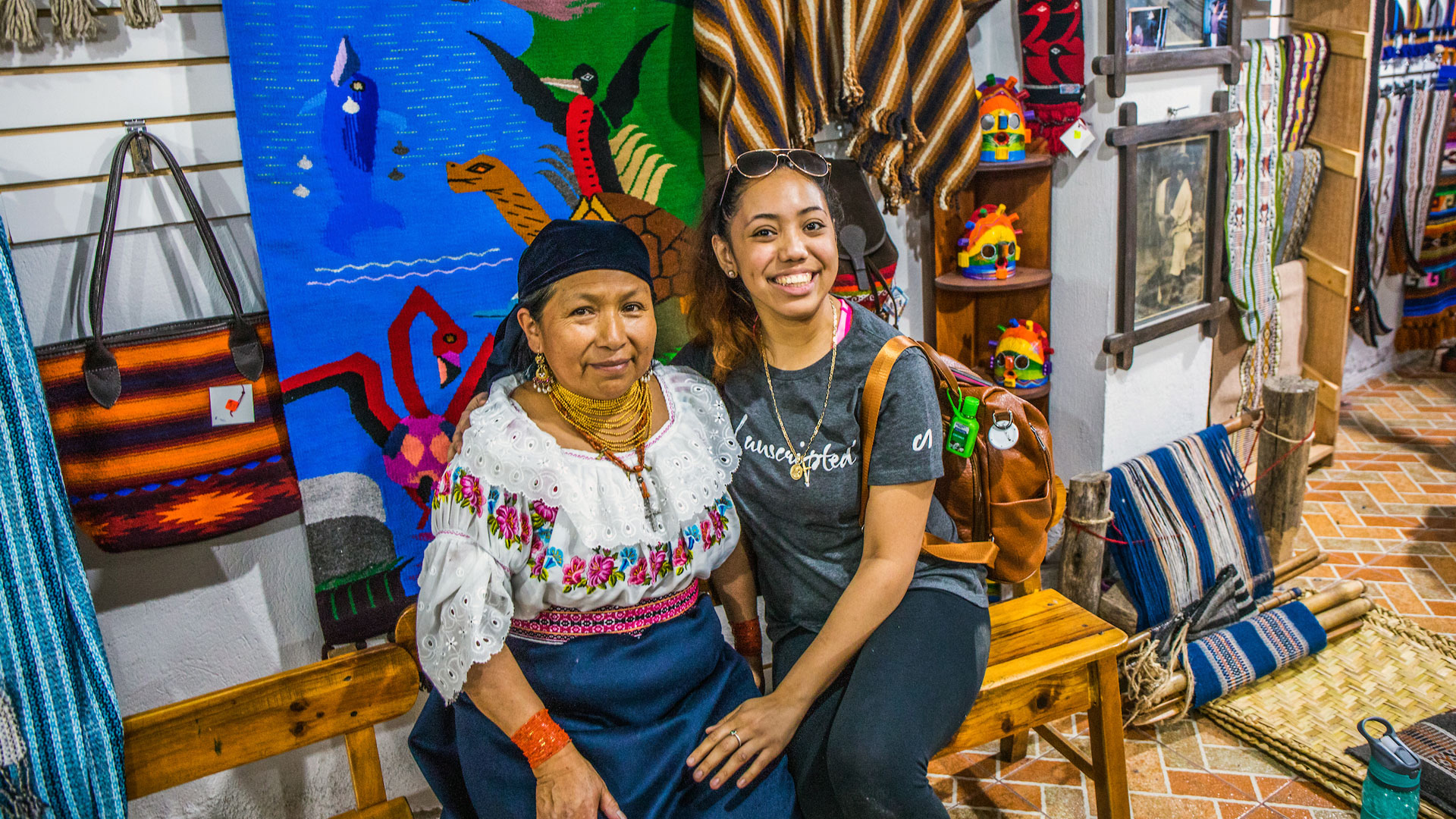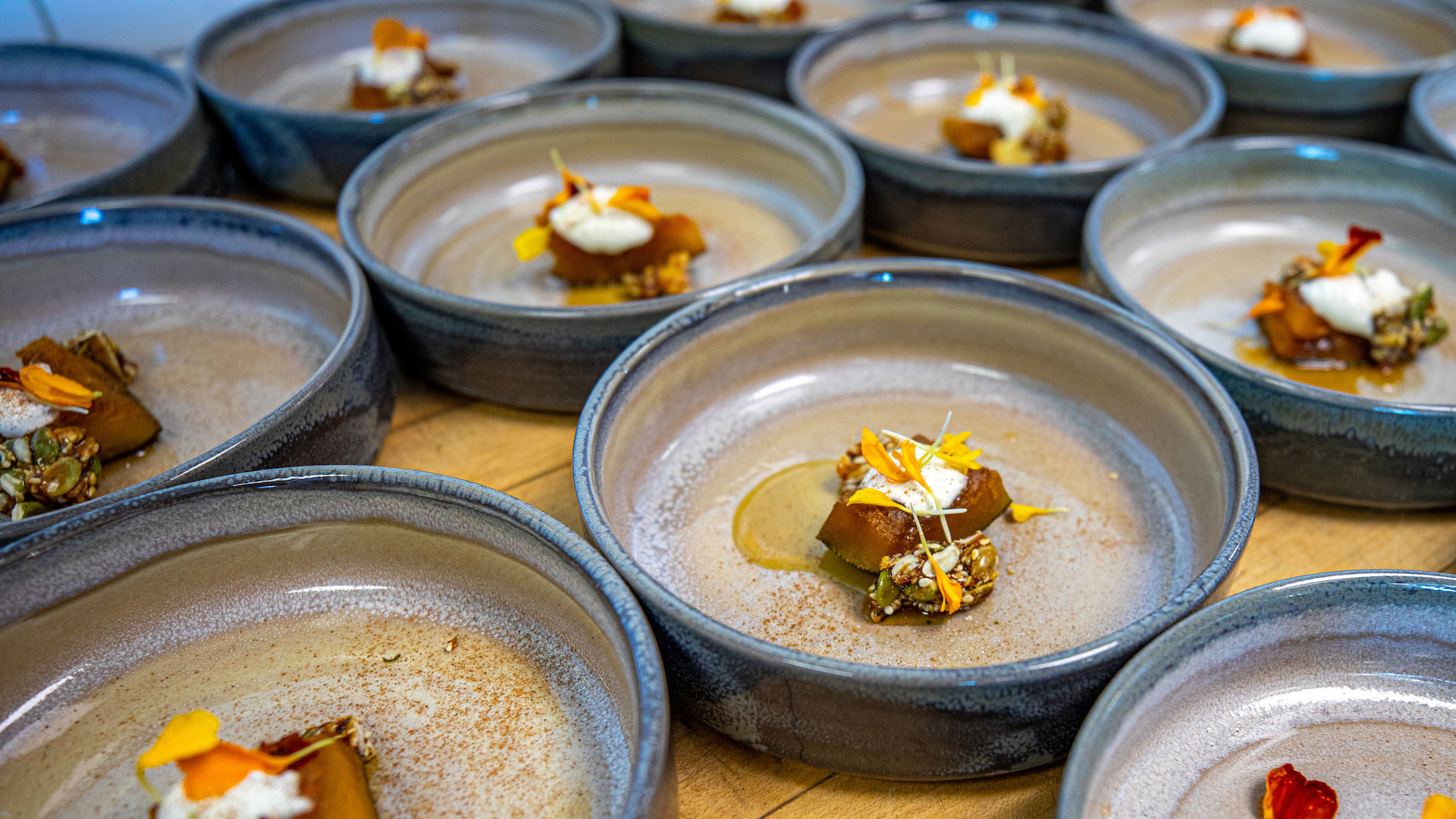How Professor Mari Dias Is Saving the World, One Student at a Time
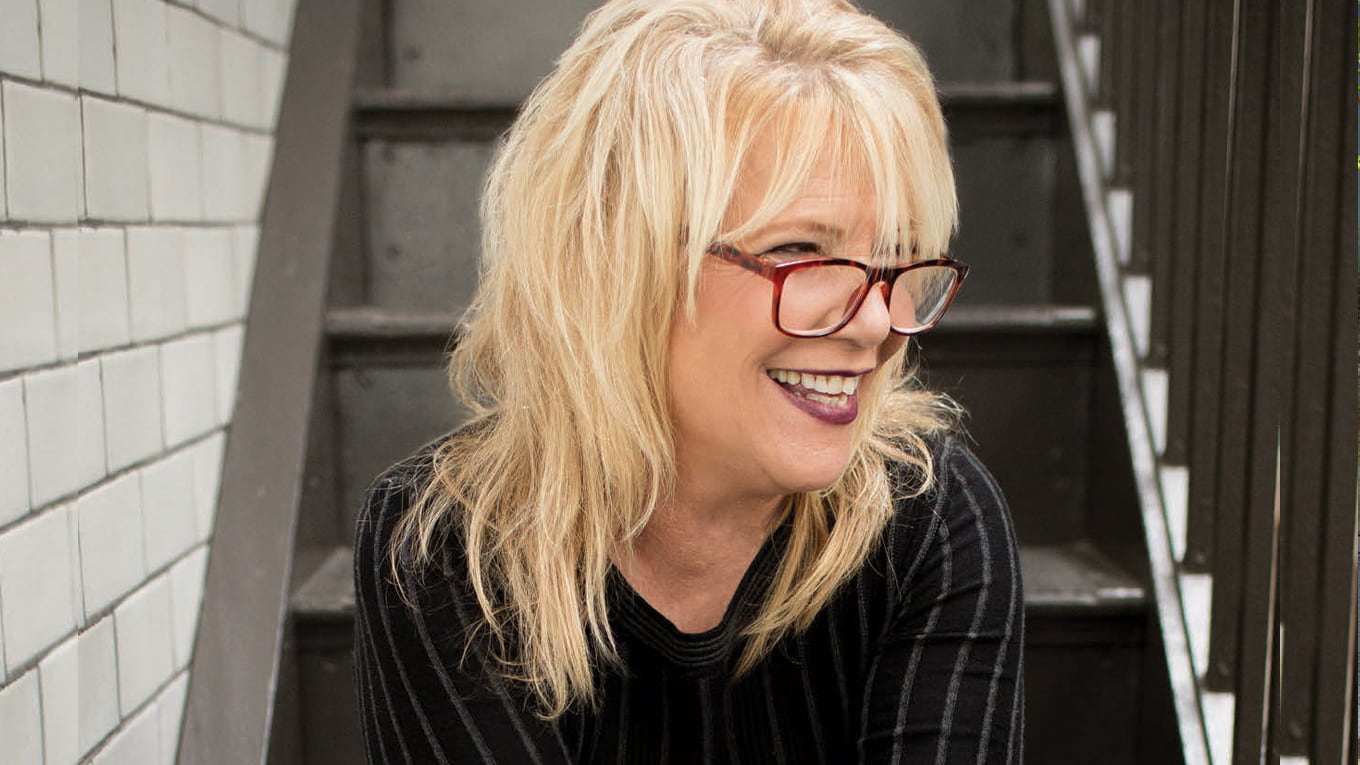
How Fulbright specialist and Professor Mari Nardolillo-Dias makes activists out of students.
The poet Mary Oliver once wrote, “What is it you plan to do with your one wild and precious life?”
This famous last line begs its reader to seize life by the fistful. After spending an afternoon on the Providence Campus with Mari Nardolillo-Dias '03, EdD, a cofounder of Johnson & Wales’ counseling psychology program, it would appear she asks herself this question daily. For Dias has led a life full of personal transformation, embracing her life fully and encouraging her students to do the same.
A petite woman with blonde hair and a deep, theatrical voice, she carries a giant cup of iced coffee that appears to contain human jet fuel. She is a force of infectious energy and I can’t wait to observe her class, the XX Factor, which combines psychology, sociology and literature to explore different waves of feminism.
Observing the XX Factor is like watching a tennis match. The conversation flies from one topic to the next, always returning to the subject at hand.
She introduces the day’s reading, “The Vagina Monologues”, and then shows a photo slideshow of a performance she attended in New Orleans that was designed to re-create the Superdome for women who survived physical and sexual abuse during the aftermath of Hurricane Katrina. As Dias clicks through the pictures, she describes how many of the women fell to their knees as they entered the theater, overcome with emotion.
Between photos, she provides much needed moments of lightheartedness that make students comfortable enough to read their favorite monologues aloud.
The first reader selects a monologue from a younger woman’s perspective while the second selects one from an older woman’s perspective. Dr. D (as her students affectionately call her) focuses on each reader, smiling, laughing and nodding to show that she relates to the pieces being read.
"Part of [Professor Dias’s] great strength is that she combines knowledge with deep kinship." Teny Gross
Afterwards, she is quick to highlight the dichotomy between the two monologues, connecting them to the different waves of feminism they have been exploring. The discussion then quickly evolves from sheepishness about the subject matter to reflections about how the medical system treats women, to existentialism, and this all within the first 30 minutes of class.
Following the monologues, she shows a YouTube video that explores discrimination by presenting an alternate reality. The film is meant to shock and the students are eager to debate the virtues and pitfalls of this approach as soon as the credits roll. They do so intensely, discussing their backgrounds, other films they have seen and the director’s artistic license.
At the end of the day, what almost any teacher wants from her students is for them to share their unique perspectives, engage in discussion and learn from each other. Both by creating a safe space and incorporating fresh material that is relevant and engaging to her students, Dias maintains a classroom that is intellectually liberating for everyone involved.
Her success perfectly illustrates the beauty of JWU’s new integrative course format.
The course design is fitting for Dr. D, who is endlessly curious and sees the interconnectedness of things. She was thrilled to create a syllabus that integrated content from different disciplines. “It was like I died and went to heaven,” she said. “My heart was racing when I chose the readings!”
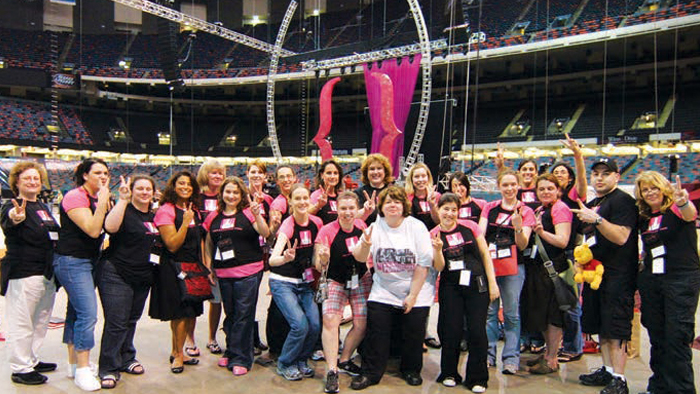
PROFESSOR DIAS + STUDENTS AT THE 10TH ANNIVERSARY OF V-DAY, THE GLOBAL MOVEMENT TO END VIOLENCE AGAINST WOMEN AND GIRLS.
AN EXTRAORDINARY CAREER
Reading has been one of Dias’ lifelong pastimes and she has long toyed with the idea of writing a humorous memoir.
She is a gifted storyteller who finds both the humor and the deeper meaning in life. She grew up the only girl in a Catholic family in which she jokes, “the boys are baptized in a fine Barolo wine and the girls are baptized in tap water.” Her father owned a funeral home in Cranston, Rhode Island, and she learned to read by sitting on his lap and sounding out words in the local obituaries.
As she grew up, she longed to join in the family business by becoming a mortician. Her father was resistant to this idea so she pleaded with him to give her a test to prove herself.
Thinking she would lose courage, he sent her to observe the embalming of an infamous mobster who had been executed “gangland style.” Dias was captivated and returned home with even more conviction. However, because she was female, her father would not let her join the business.
She was nevertheless determined to make her mark on the world and set about an extraordinary career throughout which she has championed disenfranchised populations.
She fell in love with the field of counseling by accident while studying English at Rhode Island College, after she accepted a part-time vocational counseling job. She was fascinated by her clients — they reminded the English major of literary characters — and skilled at providing an empathetic and nonjudgmental ear. As a result, she switched programs, ultimately completing a master’s degree in counseling.
Highlights of her career include helping women on welfare transition into the workforce, counseling survivors of dating violence, and facilitating a bibliotherapy program called Changing Lives through Literature with male maximum-security prisoners.
After turning 40 and fulfilling a bucket-list dream of starring in a play, she started a youth theater program to increase the self-confidence and emotional intelligence of young people in her community.
She was so motivated by the success of this program that she decided to pursue a doctorate in higher education. She chose Johnson & Wales because the university allowed her to tailor her program of study to her interests. After graduating in 2003, she was hired as an adjunct and continued running the theater program before accepting a full-time teaching position at JWU.
SILENT WITNESSES
As an educator, Dr. D specializes in bringing real world experiences into the classroom. She once assigned a group of sociology students to make a documentary on violence and peace in partnership with the Institute for the Study and Practice of Nonviolence. Her students filmed interviews with judges, school principals and men in prison about what causes violence and how it can be solved. In reflecting on the collaboration, Executive Director of the Institute Teny Gross commends Dias’s approach: “Part of her great strength is that she combines knowledge with deep kinship. Her students feel their opinions really matter, which is why they are invested in learning.”
The documentary exposed Dias to Silent Witnesses, a national initiative that uses community-based exhibits to raise awareness about domestic violence. The exhibits consist of red wooden figures with shields on their chests that tell the stories of individuals who were killed as a result of violence. Dias started a Silent Witness chapter at JWU the following term and assigned her next class of sociology students to interview victims’ families, build 16 figures and create shields for them.
Creating Silent Witnesses exposed her to the family of Lindsay Ann Burke, a young woman from Rhode Island who was brutally murdered by her boyfriend in 2005. Dias saw the footage her students captured of Lindsay’s mother and called her. That conversation evolved into Dias serving on the board of directors of the Lindsay Ann Burke Foundation and helping to create educational materials and develop legislation to protect victims and survivors of dating violence.
"This is not a job, this is not a career, this is not even a profession — this is a vocation."
By incorporating real-life scenarios and service learning into her classes, Dias encourages her students to get involved in their communities. She tells them, “You guys, this is your world. So for the next 10 weeks I am ripping off the blinders. It is my responsibility to show you the real world because this is your world. And if you want to put the blinders back on at the end of the class, that’s up to you. But I hope many of you will keep the blinders off and go out and be an impact on the world.”
She takes the responsibility to make an impact very seriously. In 2013, she traveled to the University of Zululand in South Africa as a Fulbright specialist.
There, she led a series of workshops on counseling techniques and supervision skills with social work students and practicum supervisors.
The kindness and humility of the people she encountered made a lasting impression on her and gave her yet “another experience to bring into the classroom, to make things more real, more alive.”
Because of her teaching excellence and rich experience in the field, JWU’s College of Arts & Sciences sought her out to help them start a counseling psychology major. She collaborated with three other faculty members to design the undergraduate and graduate programs, which started admitting students in 2011. Graduates of these programs gain supervised clinical experience, obtained through internships, which puts them on the fast track for finding work.
From day one, she tells incoming students, “Know that if you are sitting in this room, this is not a job, this is not a career, this is not even a profession — this is a vocation. And if you don’t have it running through your blood, if you don’t know that everybody can change, don’t go into counseling.”
Her passion for helping others has gained widespread recognition. “She is one of the most dynamic, creative and committed professors I have had the pleasure of working with,” says David Newman, chair of the social sciences department at JWU. “She is a friend, a colleague and the best reminder for all of us of what a professor could and should do: Be engaged with students, with colleagues both within the university and at other universities and with the larger community surrounding us.”
In 2013 she received several awards including the distinguished Jefferson Award from the United Way and NBC 10, which annually recognizes a volunteer who has made outstanding contributions to her community. That same year, she turned 61 and began thinking about the next chapter of her life.
She decided to volunteer for hospice and use her skills to help patients and their families cope with terminal diagnoses. “It is so empowering,” she says, “to be able to spend the last 6 months of someone’s life with them and to provide dignity, which so many of them don’t have, especially if they don’t have a family.”
She describes how one patient wanted to leave a legacy behind by speaking to a group of students. Dias videotaped her story so it would “live forever at the counseling program at Johnson & Wales.” She uses this clip to illustrate people’s reflections on death and dying, and recently incorporated it into a very successful lesson on end–of–life care with a group of JWU physician assistant students.
In March of this year, her experiences with hospice led her to open a private practice called GracePointe Grief Center, which focuses on helping clients heal from grief and loss. Opening GracePointe represents a return to her past and a door into her family’s business. Her brothers display information about her practice at the funeral home and include it in every pre-arrangement packet their clients receive.
This new addition to her career also illustrates Dias’ commitment to reinvention and using her one wild and precious life to make an impact on the world. “If I see it, I will go after it,” she says. “I always tell my students … my gravestone is gonna say, ‘I’m not finished yet.’ Even if I am 110.”
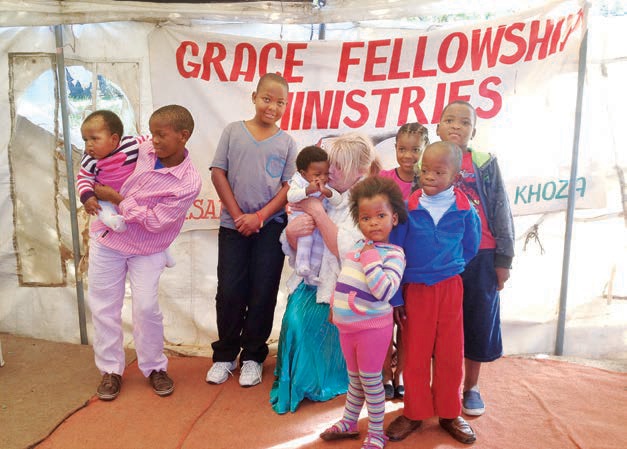
PROFESSOR MARI DIAS AT A TENT CHURCH DURING HER FULBRIGHT IN SOUTH AFRICA.
